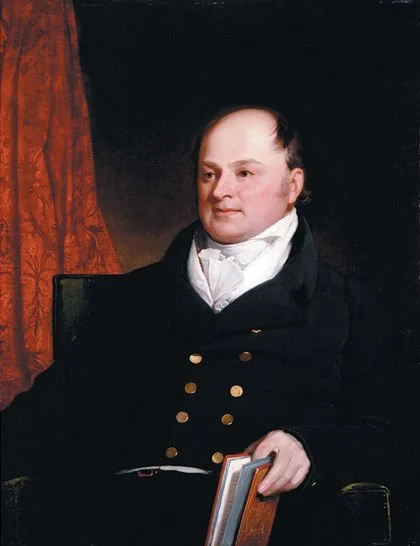
Don’t be a slob, become president
John Quincy Adams as a young man
“You come into life with advantages which will disgrace you if your success is mediocre. And if you do not rise to the head not only of your own profession, but of your country, it will be owing to your own laziness, slovenliness and obstinacy.“You come into life with advantages which will disgrace you if your success is mediocre. And if you do not rise to the head not only of your own profession, but of your country, it will be owing to your own laziness, slovenliness and obstinacy.’’
— Then Vice President (and the next President) John Adams (1735-1826) to his son John Quincy Adams (1767-1848), then a teenager, in 1794. John Quincy Adams managed to become secretary of state, president and congressman, in which job he led the opposition to slavery. Both Adamses are buried at the United First Parish Church, in Quincy, Mass.
David Warsh: Say goodbye to the Monroe Doctrine
John Quincy Adams, who as President James Monroe’s secretary of state, was one of the fathers of the Monroe Doctrine, which was announced on Dec. 2, 1823.
SOMERVILLE, Mass.
Everybody agreed that the language was blunt. China’s president, Xi Jinping, last week told a national audience, “Western countries led by the United States have implemented all-round containment, encirclement and suppression of China, which has brought unprecedented grave challenges to our nation’s development,” Xi was quoted as saying by the official Xinhua News Agency.
The next day Gen. Laura J. Richardson, commander of the U.S. Southern Command, which is responsible for South America and the Caribbean, testified before the House Armed Services Committee that China and Russia were “malign actors” that are “aggressively exerting influence over our democratic neighbors…” She continued:
Among other activities, China has built a massive embassy in the Bahamas, just 80 kilometers (50 miles) off the coast of Florida. “Presence and proximity absolutely matter, and a stable and secure Western Hemisphere is critical to homeland defense.
The day after that, Saudi Arabia and Iran agreed to re-establish diplomatic ties, The Middle East powers have a long history of conflicts. China hosted the talks that led to the breakthrough. Peter Baker, of The New York Times, wrote,
This is among the topsiest and turviest of developments anyone could have imagined, a shift that left heads spinning in capitals around the globe. Alliances and rivalries that have governed diplomacy for generations have, for the moment at least, been upended.
With good books piling up on my side table – Accidental Conflict: America, China, and the Clash of False Narratives (Yale, 2022), by Stephen Roach; Danger Zone: The Coming Conflict with China (Norton, 2022), by Hal Brands and Michael Beckley; Cold Peace: Avoiding the New Cold War (Liveright, 2023), by Michael Doyle – I decided instead to look back at a 12-year old book, Time to Start Thinking: America in the Age of Descent (Atlantic Monthly Press), by Edward Luce.
Roach, an economist, is a former chairman of Morgan Stanley Asia. Brands, a historian, is a professor at Johns Hopkins University. Beckley, a political scientist, is an associate professor at Tufts University. Michael Doyle, a political scientist, is a professor at Columbia University.
But Luce is the U.S. national editor and columnist of the Financial Times, and his column last week appeared under the headline, “China is Right about U.S. Containment,”
[L]oose talk of U.S.-China conflict is no longer far-fetched. Countries do not easily change their spots. China is the middle kingdom wanting redress for the age of western humiliation; America is the dangerous nation seeking monsters to destroy. Both are playing to type.
The question is whether global stability can survive either of them insisting that they must succeed. The likeliest alternative to today’s U.S.-China stand-off is not is not a kumbaya meeting of minds but war.
When I picked up Luce’s The Time to Start Thinking, what struck me was how pessimistic his tone was. He had taken nine months off from his newspaper, traveling for six months and writing for three. He recorded encounters with all kinds of Americans, mostly powerful, some without power. His title came from the Sir Ernest Rutherford, winner of the 1908 Nobel Prize in Chemistry: “Gentleman, we have run out of money. It is time to start thinking.” I was reminded immediately of Aaron Friedberg’s The Weary Titan: Britain and the Experience of Relative Decline, 1895-1905.
Luce was writing in the aftermath of a lengthy recession, the Tea Party election, the 2008 financial crisis, and the debacle of the U.S. war in Iraq. The last chapter begins, “Why the coming struggle to reverse America’s decline faces long odds.” It concludes, “The truth is America’s stock has been falling around the world for quite a while…. Simply proclaiming the superiority of the American model is not helping anyone’s credibility.” Ahead lay the presidencies of Donald Trump and Joe Biden, and an ill-understood war in Ukraine.
Yet last week Luce was warning against the folly of trying to “contain” China’s expansion on the basis of the Cold War blueprint that worked well against the Soviet Union, encouraging the U.S. to compete on its merits instead. “Unlike the USSR, which was an empire in disguise, China inhabits historic boundaries and is never likely to dissolve. The U.S. needs a strategy to cope with a China that will always be there… Betting on China’s submission is not a strategy.
Instead, Luce counseled, the U.S. should muster its revolve and rely on its advantages. It has “plenty of allies, a global system that it designed, better technology, and younger demographics.” China is aging, its growth is slowing, though its leaders nurse ambitions not to change, but to set the rules of the game. The big difference that Luce stressed in 2012, while China is still flush, the US has overspent.
So what will it be? War over Taiwan? A symbolic moon-race to AI? Or a sometimes-smoldering era of systemic competition in all four corners of the earth? We are not out of money, but it is well past the time to start thinking.
David Warsh, a veteran columnist and an economic historian, is proprietor of Somerville-based economicprincipals.com, where this column originated.



